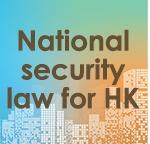The “primary election” on Saturday and Sunday, organized by Benny Tai Yiu-ting and Power for Democracy, was an aftershock of the “black revolution” that has caused unprecedented damage to Hong Kong since June last year.
![]()
The “primary” was part of the “black revolution” because it was the follow-up to the anti-China forces’ victory in the sixth-term District Council election last year during the height of the “black revolution”. Now Tai has his eyes on duplicating that feat by helping the opposition camp seize more than half of the seats in the Legislative Council in September. Then he will attempt to complete a power “hat trick” by making opposition figures the majority of the Chief Executive Election Committee, which would let him pull off a direct showdown with the central government over the appointment of an opposition chief executive-elect. Besides, all the participants, including candidates and voters, in the “primary” are hardcore supporters if not the mainstay of the “black revolution”. Upon completion of the “primary”, Tai announced that hundreds of thousands of voters turned up to “create a miracle in Hong Kong’s political history”, when in reality they merely staged an after-party of the “black revolution”.
The “primary” may sound great, but it was merely an aftershock of the yearlong “black revolution”. After the National Security Law took effect on the night of June 30, only a few scattered disturbances occurred in the Central and Wan Chai districts on Hong Kong Island, which can be seen as “twitches of a dying animal”. The deterrent effect of the new law has basically put an end to the yearlong “black revolution”. While campaigning for the “primary”, none of the candidates tried to remind people of the illegal campaign with such slogans as “Five demands, not one less” and “Liberate Hong Kong, revolution of our time”. Instead, they made sure nothing provocative was shown next to the names, photos and the political affiliations of the candidates. Apparently they understood it was not the right time to take risks, no matter how much they wanted to. Although the “primary” was just left over from the “black revolution”, the special administrative region government and residents who wish Hong Kong better off should not take it lightly.
The SAR government must take necessary legal actions against the opposition camp’s illegal “primary”, to not only prevent similar aftershocks of the “black revolution” from happening but also to rid the education system of political contamination
To start with, why did the SAR government allow the “primary” to proceed? It was a serious mistake because neither the Basic Law nor Hong Kong law mentions “primary” in any shape or form regarding Legislative Council elections. That means the “primary” last weekend was illegal, period.
On July 9, Secretary for Constitutional and Mainland Affairs Erick Tsang Kwok-wai warned that the “primary” may constitute a violation of the National Security Law. Article 29(3) of the law stipulates that rigging or undermining an election in the Hong Kong Special Administrative Region, which is likely to cause serious consequences, qualifies as an offense endangering national security. Even within the opposition camp, Sin Chung-kai and Lee Wing-tat from the Democratic Party criticized serious loopholes in the “primary” that might lead to vote-rigging.
Furthermore, Hong Kong was already hit by the third wave of the COVID-19 pandemic when the “primary” was held, but the poll organizers proceeded with their group activities, in serious breach of the social-distancing rules.
Prior to the “primary”, the Senate of the University of Hong Kong ruled that Tai, who was sentenced to prison for launching the illegal “Occupy Central” movement in 2014, committed misconduct but his actions did not amount to grounds for dismissal from his post in the Faculty of Law. It reveals that there is no shortage of scholars in the HKU or even other universities who embrace the so-called “achieving justice by violating the law”. At a Saturday education forum, Hong Kong Chief Executive Carrie Lam Cheng Yuet-ngor attributed the existing problems of education in Hong Kong to the politicization of school campuses. The SAR government, therefore, must take necessary legal actions against the opposition camp’s illegal “primary”, to not only prevent similar aftershocks of the “black revolution” from happening but also to rid the education system of political contamination. By the way, it is imperative that the Senate of the HKU fulfill its duty as the gatekeeper to keep Tai away from the university, which is an action that will fulfill HKU’s role as a higher-education institution in the HKSAR of the People’s Republic of China.
The results of the “primary” show traditional “pan-democrats” have been marginalized by the emerging radicals riding the waves of “Occupy Central” and the “black revolution”. Those radicals excel in nothing but destruction; they have no knowledge nor experience in public policy research. If they were allowed to take control of the seventh-term Legislative Council, Hong Kong residents would be the first and foremost to suffer for sure. They must be careful in casting their votes in the September LegCo election.
The author is a senior research fellow of China Everbright Holdings.
The views do not necessarily reflect those of China Daily.



